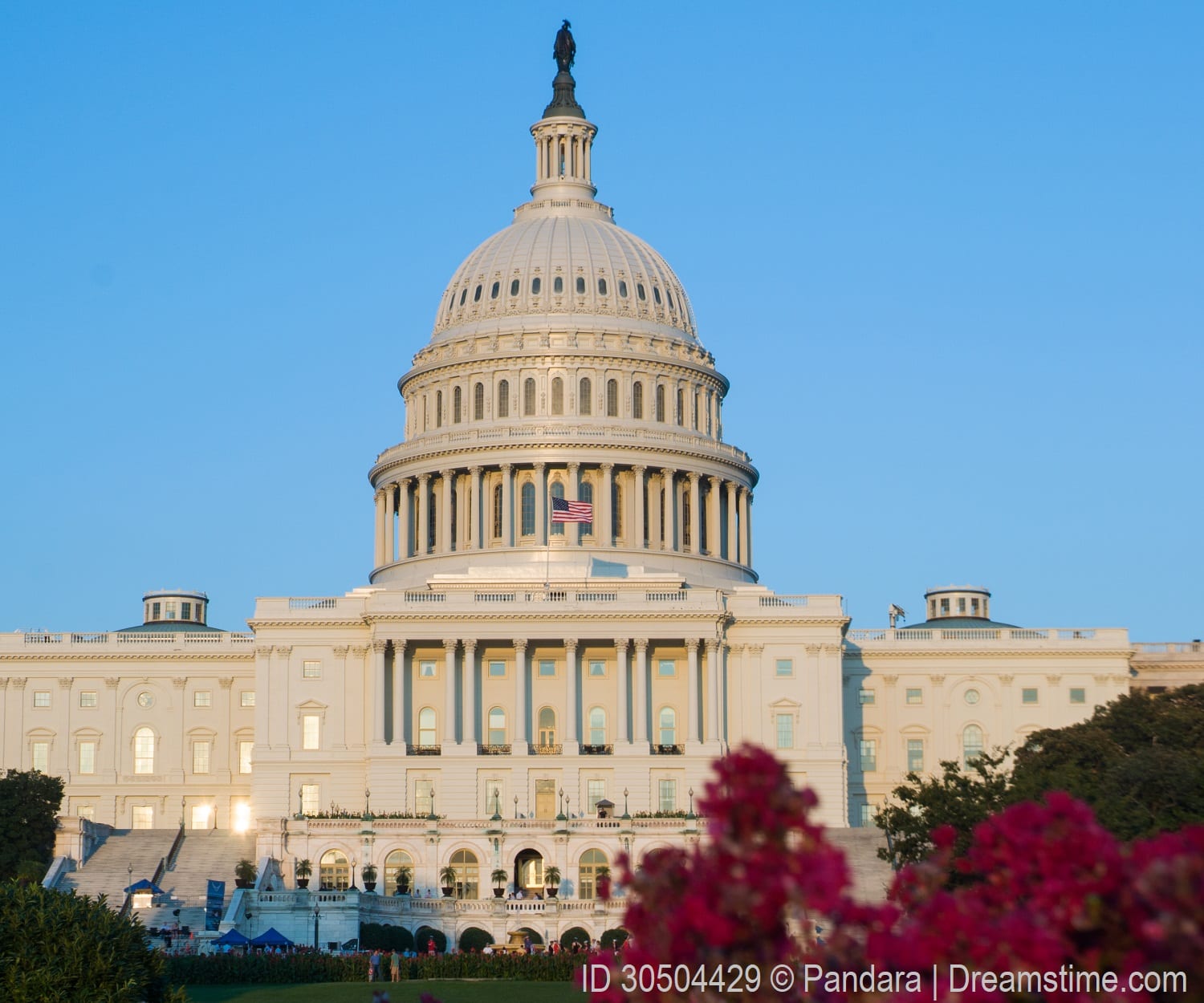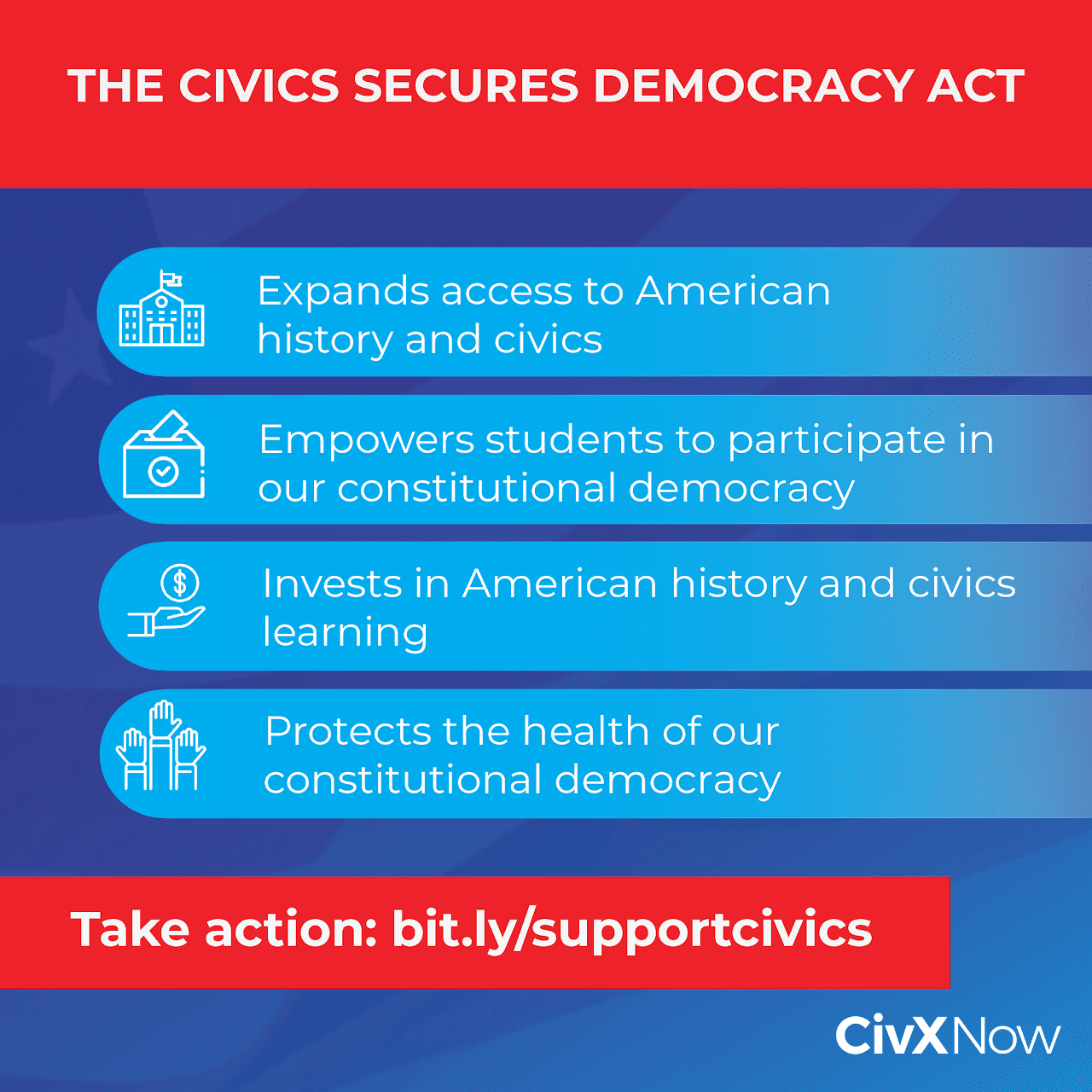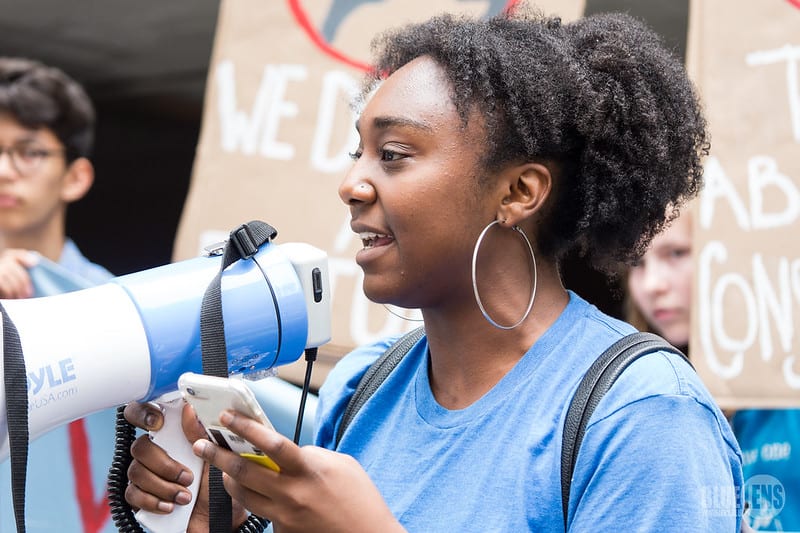Here at Population Education, we’ve written about the need for more robust and comprehensive civics education among K-12 students in the U.S. A hopeful sign emerged from the U.S. Congress this month with the reintroduction of the Civics Secures Democracy Act, bipartisan legislation that would commit $1 billion annually for six years to strengthening civics education.
Population Connection, along with over 150 other educational organizations and institutions in the CivXNow Coalition, have already endorsed the legislation, which was introduced in the U.S. House of Representatives by Rep. Rosa DeLauro (D-CT), Rep. Tom Cole (R-OK) and Rep. Earl Blumenauer (D-OR), and in the U.S. Senate by Sens. Chris Coons (D-DE) and John Cornyn (R-TX).
Why is Investment in Civics Education Needed?
For too long social studies education, and specifically civics and U.S. government, has gotten short-shrift in our K-12 curriculum priorities. As the emphasis turned to reading and math fundamentals (“No Child Left Behind” and “Race to the Top”) and STEM education over the past 20 years, less money and time have been allocated to everything else. Compared with STEM education, which is funded at a rate of $50 per student per year in the U.S., civics and history education are funded at a rate of just 5 cents per student per year.
Citizenship education used to be part of a core curriculum in many school districts, but those days are long gone. As a result, surveys show Americans’ basic knowledge about our system of government is woefully inadequate, and even threatens our democratic future.
 In the most recent, annual Annenberg Civics Knowledge Survey, about half of the respondents couldn’t name the three branches of government. Nearly a quarter couldn’t even identify one branch. One in five Americans can’t name any of the five rights protected by the First Amendment. A well-functioning democracy depends on an educated citizenry. If people don’t know their rights, how laws are made and implemented, and how our system of checks and balances functions, civic engagement falters and disinformation fills the knowledge vacuum.
In the most recent, annual Annenberg Civics Knowledge Survey, about half of the respondents couldn’t name the three branches of government. Nearly a quarter couldn’t even identify one branch. One in five Americans can’t name any of the five rights protected by the First Amendment. A well-functioning democracy depends on an educated citizenry. If people don’t know their rights, how laws are made and implemented, and how our system of checks and balances functions, civic engagement falters and disinformation fills the knowledge vacuum.
It’s taken a recent series of “civics crises” to get more people focusing on this glaring gap in K-12 instruction. Since the start of 2021, we’ve seen a violent mob of misinformed citizens attack the U.S. Capitol, a presidential impeachment trial, and an unprecedented number of voter suppression laws introduced in state legislatures. This followed a year of federal-state conflicts over pandemic mitigation efforts, racial justice protests across the country, a kidnapping attempt on a governor, a rushed-through Supreme Court pick (27 days from nomination to confirmation), and another presidential impeachment trial. All of these events have spurred more interest in our Constitution, Bill of Rights and civic engagement in general. And yet, studies show that Americans have low levels of trust in their government and in their fellow citizens to participate in governance.
Just eight states and D.C. currently require a full-year course in civics/U.S. government to graduate high school. In addition to an understanding of our democratic system, a strong curriculum also includes media literacy and an emphasis on public participation. Research shows students who receive quality civics education are more likely to vote, volunteer in their communities, engage with policymakers and develop life skills that help them academically and professionally.
What’s Included in the Civics Secures Democracy Act?
According to the iCivics, which is organizing support for the bill, the act will work to:
- Protect the health of our constitutional democracy by prioritizing American history and civics in our nation’s schools
- Reverse chronic underinvestment by providing funding to states and school districts to support quality history and civic education that informs and empowers students to participate in our constitutional democracy
- Encourage more frequent and robust administration of the National Assessment of Education Progress (NAEP) in history and civics, providing rich data on student outcomes for teachers, school districts and states
- Support fellowship programs to strengthen our history and civics teaching corps and diversify the educator pipeline.
A New Approach to Civics Education
So, what should be included in a high-quality civics curriculum? A group of scholars and educators have outlined some guiding principles in a new report, “A Roadmap to Educating for American Democracy,” in which they advocate depth over breadth. The report is arranged around seven essential themes that provide an intellectual framework for developing classroom activities. The report is meant to be a first milestone in a multi-year project to expand and strengthen civics education by 2030.The report authors have also published a Pedagogy Companion to the EAD Roadmap to help teachers and administrators with implementation.
Why is Civics Ed Important to PopEd?
It takes civically-minded and engaged students to tackle the many challenges that PopEd curricula address. Our educational resources work to inform students on a range of environmental and social issues, but also to motivate them to get involved with these issues as young people, and as future voters, community members and leaders.
Civic engagement is baked into many of our role-playing activities on resource management and community sustainability, as well as our inquiry and discussion-based activities that explore issues of equity, justice, human rights, and global interdependence. We also invite students to practice their civic skills with our teen activism toolkit of ideas for engaging with legislators, the media and community members on a host of issues, and to be critical consumers of information. A new investment and emphasis on civics education supports our ongoing work in curriculum and professional development and can invigorate our work to engage more students as U.S. and global citizens.





